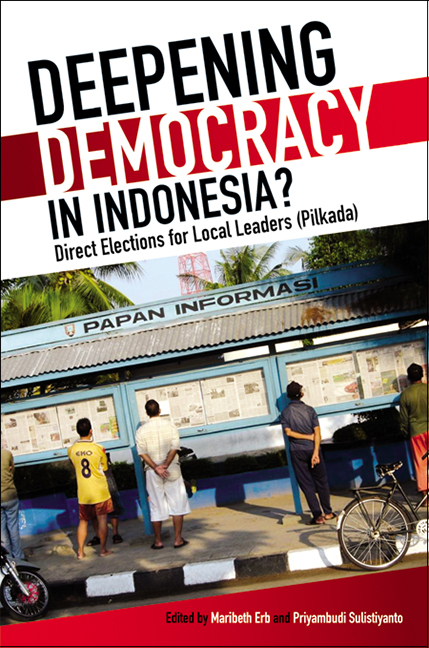Book contents
- Frontmatter
- Dedication
- Contents
- List of Tables
- List of Figures
- Contributors
- Acknowledgements
- Glossary
- 1 Indonesia and the Quest for “Democracy”
- 2 Pilkada Langsung: The First Step on the Long Road to a Dualistic Provincial and District Government
- Part I Political Parties, Politician Elites and the Voters
- Part II Media and Campaigns: Comparing Local and National Elections
- 10 Pomp, Piety and Performance: Pilkada in Yogyakarta, 2005
- 11 Assessing Media Impact on Local Elections in Indonesia
- Part III Conflict, Ethnicity, and Political Divisions
- Index
11 - Assessing Media Impact on Local Elections in Indonesia
from Part II - Media and Campaigns: Comparing Local and National Elections
Published online by Cambridge University Press: 21 October 2015
- Frontmatter
- Dedication
- Contents
- List of Tables
- List of Figures
- Contributors
- Acknowledgements
- Glossary
- 1 Indonesia and the Quest for “Democracy”
- 2 Pilkada Langsung: The First Step on the Long Road to a Dualistic Provincial and District Government
- Part I Political Parties, Politician Elites and the Voters
- Part II Media and Campaigns: Comparing Local and National Elections
- 10 Pomp, Piety and Performance: Pilkada in Yogyakarta, 2005
- 11 Assessing Media Impact on Local Elections in Indonesia
- Part III Conflict, Ethnicity, and Political Divisions
- Index
Summary
INTRODUCTION
For most Indonesian citizens, the opportunity to elect not only their members of the national parliament and their president but also their local district heads has been one of the most tangible demonstrations of democratic reform made possible by the resignation of President Soeharto in May 1998 and the withering of his authoritarian “New Order”. Subsequent laws governing the elections of leaders — from district to national level — pushed through parliament by reformist elements mean that instead of being appointed by Jakarta, provincial governors, mayors, and local district heads are directly elected by the constituency to which they are responsible. With 349 districts (kabupaten), 91 mayoralties (kota), and 33 provinces,2 all of which have to elect their heads directly, it is a long and complex process, which has been unfolding across the archipelago since 1 June 2005 when the first elections took place.
This paper discusses the relationship between the media generally (and local media in particular) and the outcomes in such local elections. It is exploratory and tentative, being based mainly on secondary materials collected by others, but builds upon and extends previous studies of this relationship (Hill 2008). The hypothesis it examines is that access to local media, and local television in particular, has already become, and is likely to be increasingly, a major factor in local electoral success in Indonesia. By extrapolation, it posits that aspiring local politicians will be seeking to exert greater influence over the media that are available in their local environs. The case studies suggest that such politicians could optimize local media access in a variety of creative ways apart from simply seeking to own it or to intimidate it — the two strategies adopted most commonly during the New Order. This paper attempts to test such assertions with reference to four very different localities, primarily using voter exit poll data collected by local election monitoring organizations.
The study is made possible because of the massive election monitoring efforts undertaken by hundreds of thousands of Indonesians, coalescing in a variety of formal organizations and alliances (several of which undertook voter attitude surveys).
- Type
- Chapter
- Information
- Deepening Democracy in Indonesia?Direct Elections for Local Leaders (Pilkada), pp. 229 - 256Publisher: ISEAS–Yusof Ishak InstitutePrint publication year: 2009



